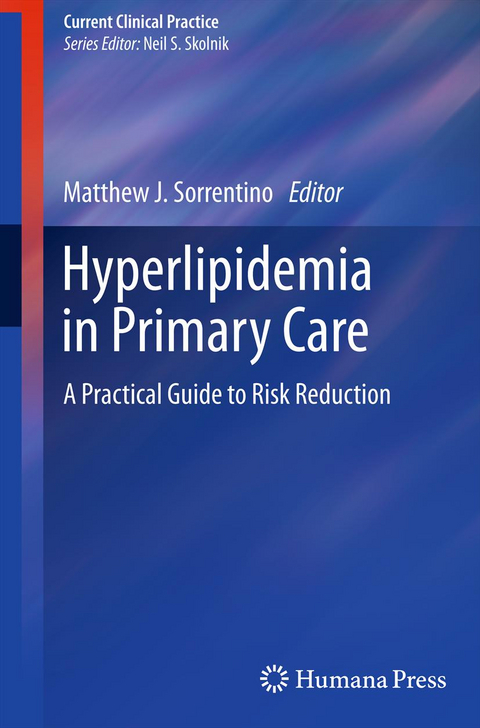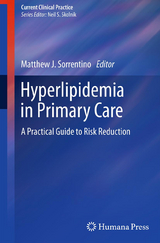Hyperlipidemia in Primary Care
A Practical Guide to Risk Reduction
Seiten
2011
Humana Press Inc. (Verlag)
978-1-60327-501-9 (ISBN)
Humana Press Inc. (Verlag)
978-1-60327-501-9 (ISBN)
This book offers a thorough understanding of the evaluation of cardiac risk and the treatment of dyslipidemias. It contains practical recommendations for a risk-reduction approach to common, difficult patient types. It includes a wide variety of therapies.
Cardiovascular disease is the number one cause of death for men and women in this country, surpassing deaths due to all cancers combined. Better awareness of heart disease risk factors and improved treatment modalities has produced great progress in reducing deaths due to myocardial infarction and stroke over the past few decades. Still, more progress is needed, as about half of all first coronary events occur in individuals who have no cardiac symptoms and no previously diagnosed heart disease. The primary care physician, therefore, has an important role in identifying at risk individuals and beginning preventive modalities. In Hyperlipidemia in Primary Care: A Practical Guide to Risk Reduction, a group of leading authorities in the field offers a comprehensive overview of the problem along with practical strategies for treating it. This unique title reviews methods for assessing risk in patients, including an important and thorough discussion of the Framingham algorithmand its limitations and advantages in assessing CVD risk. The book also reviews the evolving world of lipidology and how to apply many of the newer lipid tests to patients in daily practice, putting these tests into proper perspective and offering a rational approach to using them in practice. Finally, treatment issues are covered. As treatment has expanded to more risk groups, a number of different guidelines have been published with recommended lipid goals. This is an evolving area of research with rapidly changing guidelines that are expanding the pool of high risk patients. An invaluable reference that offers a reasonable approach to risk assessment and treatment of individuals at increased cardiovascular risk, Hyperlipidemia in Primary Care: A Practical Guide to Risk Reduction provides the background needed to make scientifically based decisions that can ultimately help greatly reduce the number of patients impacted by cardiovascular disease.
Cardiovascular disease is the number one cause of death for men and women in this country, surpassing deaths due to all cancers combined. Better awareness of heart disease risk factors and improved treatment modalities has produced great progress in reducing deaths due to myocardial infarction and stroke over the past few decades. Still, more progress is needed, as about half of all first coronary events occur in individuals who have no cardiac symptoms and no previously diagnosed heart disease. The primary care physician, therefore, has an important role in identifying at risk individuals and beginning preventive modalities. In Hyperlipidemia in Primary Care: A Practical Guide to Risk Reduction, a group of leading authorities in the field offers a comprehensive overview of the problem along with practical strategies for treating it. This unique title reviews methods for assessing risk in patients, including an important and thorough discussion of the Framingham algorithmand its limitations and advantages in assessing CVD risk. The book also reviews the evolving world of lipidology and how to apply many of the newer lipid tests to patients in daily practice, putting these tests into proper perspective and offering a rational approach to using them in practice. Finally, treatment issues are covered. As treatment has expanded to more risk groups, a number of different guidelines have been published with recommended lipid goals. This is an evolving area of research with rapidly changing guidelines that are expanding the pool of high risk patients. An invaluable reference that offers a reasonable approach to risk assessment and treatment of individuals at increased cardiovascular risk, Hyperlipidemia in Primary Care: A Practical Guide to Risk Reduction provides the background needed to make scientifically based decisions that can ultimately help greatly reduce the number of patients impacted by cardiovascular disease.
1. Cardiovascular Risk Assessment.- 2. The Metabolic Syndrome.- 3. The Role of Imaging in Cardiovascular Risk Assessment.- 4. Inherited Lipoprotein Disorders.- 5. Advanced Lipid Testing.- 6. Therapeutic Lifestyle Change for the Prevention and Treatment of Hyperlipidemia and Coronary Artery Disease.- 7. Drug Therapy for Dyslipidemia.- 8. Hypertriglyceridemia.- 9. Isolated Low HDL.- 10. Lipoprotein(a).- 11. HIV with Dyslipidemia.- 12. Treatment of Dyslipidemia in Patients with Renal Insufficiency and End-Stage Renal Disease.
| Reihe/Serie | Current Clinical Practice |
|---|---|
| Zusatzinfo | 5 Illustrations, color; 8 Illustrations, black and white; XI, 300 p. 13 illus., 5 illus. in color. |
| Verlagsort | Totowa, NJ |
| Sprache | englisch |
| Maße | 155 x 235 mm |
| Themenwelt | Medizin / Pharmazie ► Gesundheitsfachberufe ► Hebamme / Entbindungspfleger |
| Medizin / Pharmazie ► Gesundheitswesen | |
| Medizin / Pharmazie ► Medizinische Fachgebiete ► Gynäkologie / Geburtshilfe | |
| Medizinische Fachgebiete ► Innere Medizin ► Gastroenterologie | |
| ISBN-10 | 1-60327-501-0 / 1603275010 |
| ISBN-13 | 978-1-60327-501-9 / 9781603275019 |
| Zustand | Neuware |
| Haben Sie eine Frage zum Produkt? |
Mehr entdecken
aus dem Bereich
aus dem Bereich
Buch | Softcover (2024)
Urban & Fischer in Elsevier (Verlag)
CHF 76,00




